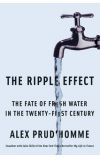
10 Jun 2011 03:45:43
A spate of books and articles has laid out possible scenarios in which population growth, pollution and mismanagement will lead to a scarcity of water in some regions. The idea that large population centers such as Phoenix and Las Vegas could be rendered uninhabitable may no longer be the stuff of apocalyptic fiction.
Prud'homme, co-author with his great-aunt Julia Child of "My Life in France," makes a thoughtful and compelling case that policymakers and average citizens should pay more attention to the precious but undervalued commodity that flows from their taps. Future wars, he suggests, may be fought over water.
This comprehensive account, reflecting exhaustive research that took Prud'homme across the country, contains a series of dramatic stories and colorful characters that highlights the degradation of the nation's once pure and abundant waters.
The book begins with the 2005 murder of a 43-year-old Ph.D. hydrochemist and mother of three whose body was recovered from the bottom of a 35-foot concrete tank at a water purification plant in northern New Jersey. The unsolved mystery serves as an introduction to the various ways in which our water supply can be contaminated.
Prud'homme segues into the sad history of some of America's most chemically befouled waters, including Newtown Creek in the New York borough of Brooklyn and the Housatonic River in Pittsfield, Mass., before detailing the impact of agribusiness-related pollution in Wisconsin and the Chesapeake Bay region.
He descends 580 feet below midtown Manhattan for a fascinating report on construction progress on a 9-mile-long tunnel that was planned more than 50 years ago to meet New York's demand for water. It's now set for completion in 2020 at an estimated cost of $6 billion.
Population growth is sure to contribute to future water scarcity, particularly in the fast-growing Southwest. Another factor is climate change, as rising temperatures result in more frequent floods and droughts. Because the biggest users of water are irrigated agriculture and power generation, the effects go well beyond the trickle from household taps.
Prud'homme sees Phoenix "as a kind of experiment in extreme living, like a dress rehearsal for life on Mars, or perhaps for a future America beset by regions of extreme heat and dryness." Las Vegas "could be relinquished to the dust, heat and tumbleweeds."
Other issues include privatization of water supplies, exemplified by the efforts of former oil wildcatter T. Boone Pickens to suck up rights to groundwater that can be sold to thirsty cities across Texas.
The book also examines bottled water, a "cultural phenomenon" embraced by tens of millions of Americans despite an exponentially higher cost than tap water and the questionable effect of the bottles and the fuel required to transport them.

